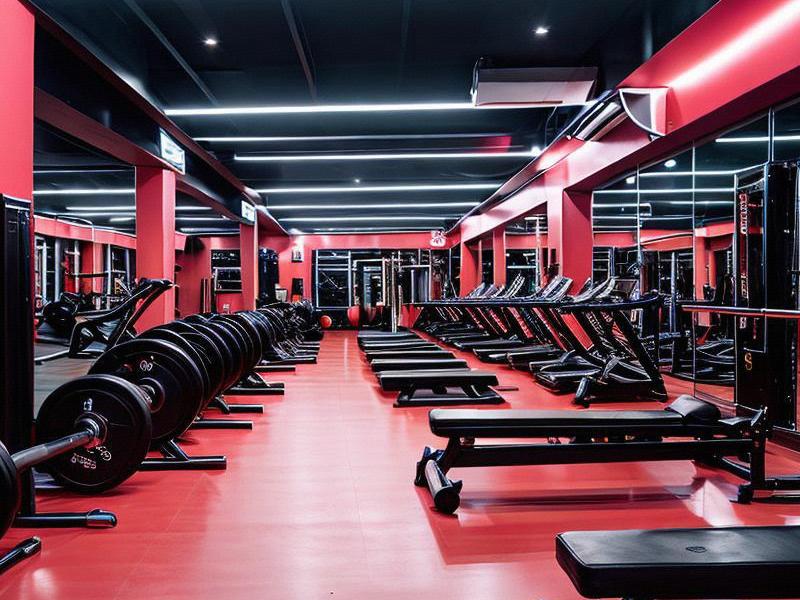
In recent years, Shanghai's health clubs have undergone a significant transformation, reflecting broader societal changes in attitudes towards health, fitness, and sexuality. Once primarily spaces for rigorous physical training, these clubs have evolved into multifaceted venues where individuals not only pursue their fitness goals but also engage in social interactions that blur the lines between exercise and personal expression.
The rise of boutique fitness studios and luxury health clubs in Shanghai has been a game-changer. These establishments offer a wide range of classes and services tailored to diverse preferences, from high-intensity interval training (HIIT) to yoga and Pilates. The emphasis on individualized experiences has created an environment where members feel more comfortable expressing themselves, including aspects of their sexuality.
One of the most notable trends is the increasing visibility of LGBTQ+ individuals in health clubs. Shanghai, known for its progressive social policies and vibrant gay scene, has seen a surge in inclusive fitness spaces. Clubs like Reebok CrossFit Soho and Equinox Shanghai have made concerted efforts to cater to this demographic by offering gender-neutral changing rooms, queer-friendly classes, and events that celebrate diversity. This inclusivity has fostered a sense of community among members, allowing them to connect on a deeper level beyond just physical fitness.
The influence of social media has also played a pivotal role in shaping the sexual culture within health clubs. Platforms like Instagram and WeChat are used not only to share fitness achievements but also to showcase personal style and identity. Members often post photos of their workouts, highlighting their bodies in ways that challenge traditional notions of modesty. This digital self-presentation has encouraged a more open dialogue about body image and sexuality, contributing to a more accepting atmosphere within clubs.
爱上海同城对对碰交友论坛 Moreover, the rise of dating apps and online communities has led to a phenomenon where health clubs double as social hubs for potential romantic encounters. Many members use their time at the gym as an opportunity to meet new people, facilitated by the shared interest in fitness and healthy living. This has created a unique dynamic where physical attraction and compatibility are intertwined with mutual respect for health and wellness.
However, this evolving sexual culture within health clubs is not without its challenges. The increasing focus on aesthetics and physical appearance has raised concerns about the pressure to conform to unrealistic standards. This can lead to body shaming and a sense of inadequacy among members who do not fit the idealized images perpetuated by social media and marketing campaigns.
Additionally, the blurring of boundaries between professional and personal interactions within clubs has sparked debates about appropriate behavior. While some view the gym as a space for both fitness and socializing, others argue that it should remain a sanctuary for exercise, free from the complexities of dating and relationships. Striking a balance between these perspectives is crucial for maintaining a positive and inclusive environment.
上海品茶网 The impact of Shanghai's health club culture extends beyond the confines of these establishments. It reflects broader societal shifts towards greater acceptance of diverse lifestyles and identities. As more people embrace fitness as a means of self-expression and personal growth, health clubs have become symbols of empowerment and progress.
The influence of international trends has also been significant. Global fitness brands and influencers have brought new ideas and practices to Shanghai, enriching the local fitness landscape. This cross-cultural exchange has contributed to a more dynamic and evolving sexual culture within health clubs, as members are exposed to diverse perspectives and approaches to fitness and relationships.
However, it is essential to acknowledge the potential risks associated with the commercialization of health clubs. The emphasis on aesthetics and social status can sometimes overshadow the original purpose of these establishments: promoting physical and mental well-being. This underscores the importance of maintaining a holistic approach to fitness, one that prioritizes health over appearance.
上海娱乐联盟 The role of health clubs in shaping modern lifestyles cannot be overstated. They have become integral to the lives of many Shanghai residents, offering not just a place to exercise but also a community where individuals can connect, express themselves, and explore their identities. The evolving sexual culture within these clubs reflects the broader societal changes in attitudes towards health, fitness, and sexuality.
In conclusion, Shanghai's health clubs are at the forefront of a cultural shift that redefines the boundaries between fitness, social interaction, and personal expression. The increasing visibility of LGBTQ+ individuals, the influence of social media, and the rise of dating apps have all contributed to a more inclusive and dynamic environment. However, challenges such as body image pressures and the blurring of professional and personal boundaries must be addressed to ensure that health clubs remain spaces of empowerment and progress.
As Shanghai continues to evolve, so too will its health clubs, reflecting the ever-changing dynamics of society. The key lies in fostering a culture that values diversity, promotes well-being, and respects individual boundaries. By doing so, health clubs can continue to serve as vital hubs for personal growth and social connection, shaping the future of fitness and sexuality in the city.
In the end, the story of sexual culture in Shanghai's health clubs is one of progress and possibility. It is a testament to the city's openness to change and its commitment to creating spaces where individuals can thrive, both physically and emotionally. As we look to the future, the evolution of health club culture will undoubtedly continue to reflect the broader societal trends that define our times.
